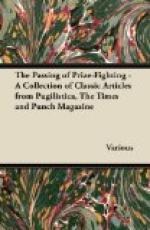Gullane, N.B.
Dear Sir,—One of the most striking results of the War has been its effect on the mentality of birds and animals and even fishes. The papers have lately contained accounts of a halibut which swallowed a cormorant and survived the exploit only to fall a victim to the wiles of a North Sea fisherman. As the cormorant is generally regarded to be the dernier cri in voracity, the incident illustrates the old saying of the biter bit. As a rule birds of prey have the upper hand in their contests with the finny denizens of the deep. But the triumph of the halibut is not altogether unprecedented. I remember, when I was cruising in the China Seas in the year 1854, witnessing a combat between a dolphin and a Bombay duck, in which the latter came off second-best. And some thirty years later, during a yachting excursion off the Scilly Isles, I saw an even more remarkable duel between a porbeagle—as the Cornish people call the mackerel-shark—and a pipit, in which, strange to relate, the bird came off victorious.
Believe me to be, Sir,
Yours truthfully,
CONSTANTINE PHIBSON.
Tara, Diddlebury.
DEAR SIR,—When
I was an undergraduate at Cambridge in the
’sixties a “Limerick”
was current which began as follows:—
“There was
an adventurous sole
Which swallowed
an albatross whole.”
Unfortunately I cannot remember the conclusion of the stanza, nor am I able to state whether it was founded on fact or was merely an ebullition of lyrical fancy. In the latter case the lines are a striking instance of the prophetic power of minstrelsy, and justify the use of the word “vates,” or seer, as applied to poets by the ancient Romans.
I have the honour to be, Sir,
Yours faithfully,
SEPTIMUS BOWLONG.
Rougemont Villa, Crookhaven.
DEAR SIR,—The halibut-cormorant episode has attracted undue attention, since many similar but far more extraordinary incidents have occurred during the War, but have passed unrecorded owing to the claims of Bellona. I will confine myself to one which was witnessed by my daughter Anna in course of bathing at Sheringham in August, 1917. While swimming underwater she collided with a middle-sized sea-serpent, which was evidently in difficulties and made its way to the beach, where it expired. The post-mortem, which was conducted by Professor Darcy Johnson, F.R.S., revealed that the serpent had been choked by a gigantic gooseberry, which had formed part of the cargo of a Greenland tramp torpedoed by an enemy submarine. The serpent was actually being stuffed when a bomb dropped by a Zeppelin blew it into infinitesimal smithereens, to the profound disappointment of the Professor and my daughter Anna, who has never been quite the same woman since. Permit me to subscribe myself
Yours faithfully,




